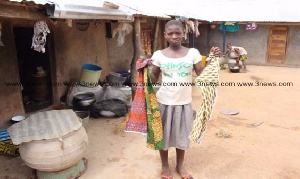Regional News of Monday, 29 May 2017
Source: 3news.com
Adolescent girls in rural areas still use rags as sanitary pad
Despite the abundance of sanitary pads, some adolescent girls in some communities in the Northern Region continue to use rags during their menstrual cycle, whiles others have no or little knowledge on menstrual hygiene.
Checks by TV3 has revealed there are no sanitary pads in shops at most rural communities in the region, and in areas where there is availability, affordability has become a challenge to parents and their girl child.
Most adolescent girls, including 13-year-old Tibornyaan Yabdow from Nanjuni in the Yendi District have no option than to resort to the use of rags as sanitary pads whenever they are in their menstruating.
As the world marked Menstrual Hygiene Day on Sunday, May 28, TV3 interacted with Tibornyaan who has January this year when she started menstruating, been using rags as sanitary pad.
Growing up and seeing the changes that comes with adolescence, Tibornyaan knew she was closer to her menstrual cycle hence was always on the lookout for her menses to save her any embarrassment among her classmates.
“It was on January 18, 2017, I was in the classroom when I began feeling pains in my waist and my whole body as well. Minutes later, I felt something dripping in my panties, I went to the school urinal and checked, It was then that I found out that it was blood,” she told TV3 She said she returned to the classroom to ask permission from her teacher to go home, only to be met with a barrage of questions from her mother.
“I told her I have had my menses and that is why I have come home, she took me inside, asked me to bath and come and when I returned, she tore up a new cloth and fitted it into my panties to avoid staining my uniform” she narrated.
Four months on, the three pieces of rags bequeathed her by her mother during her first menstruation still serves as sanitary pads. She washes each of the rag after each use, and reuse them.

“I wash and iron the rags after each menstruation and keep them in my bag till the next one” she said.
Asked if she has seen a sanitary pad before, she answered in the affirmative but was quick to add that her mother is unable to afford sanitary pads for her.
Tibornyaan lives one hour drive away from the main community, Gnani, and if she has the means to buy a sanitary pad, she said distance will be an impediment to her.
Checks at shops in the community showed non-availability of sanitary pads.
The story of Tibornyaan is no different from her peers in rural Ghana.
While teenagers in the urban Ghana get to speak about menstruation and even get assistance from their parents or guardians on how to stay hygienic during their menstrual periods, same cannot be said of the rural adolescent girl.











